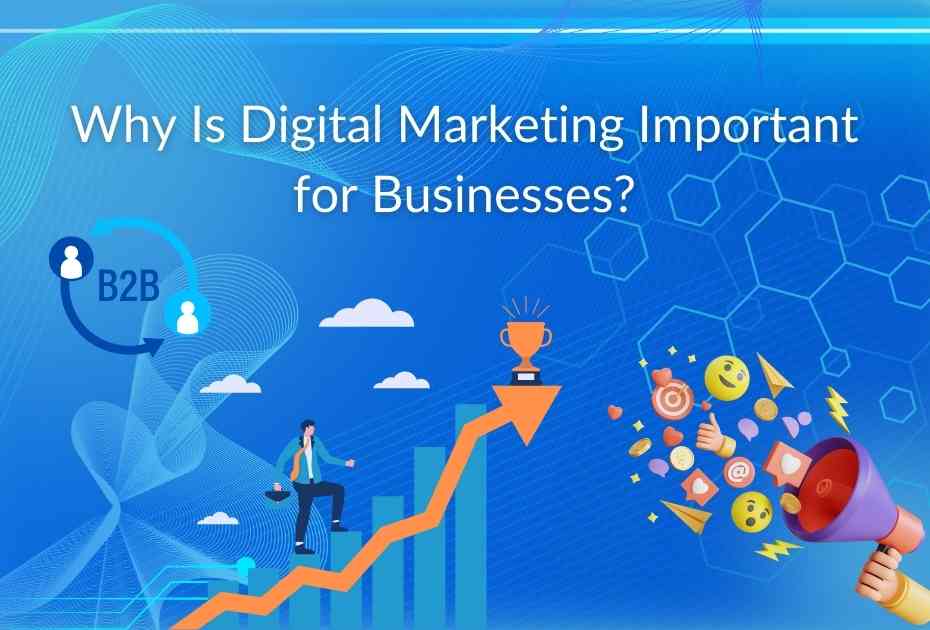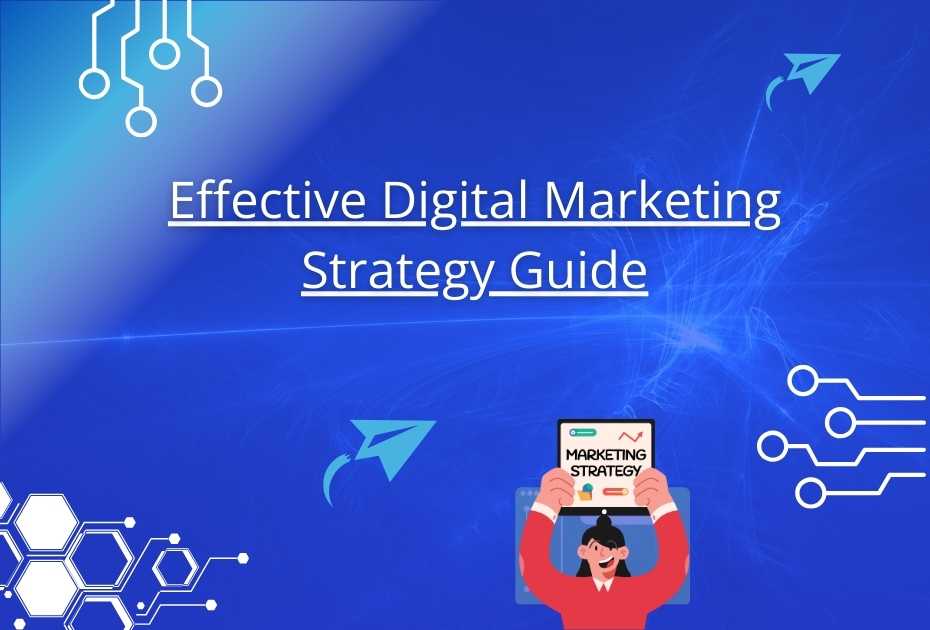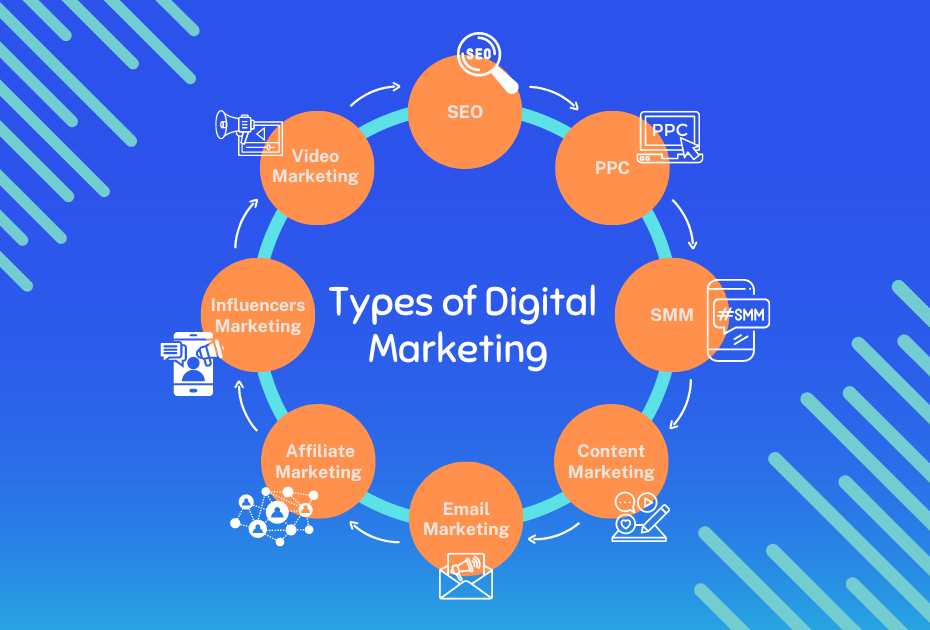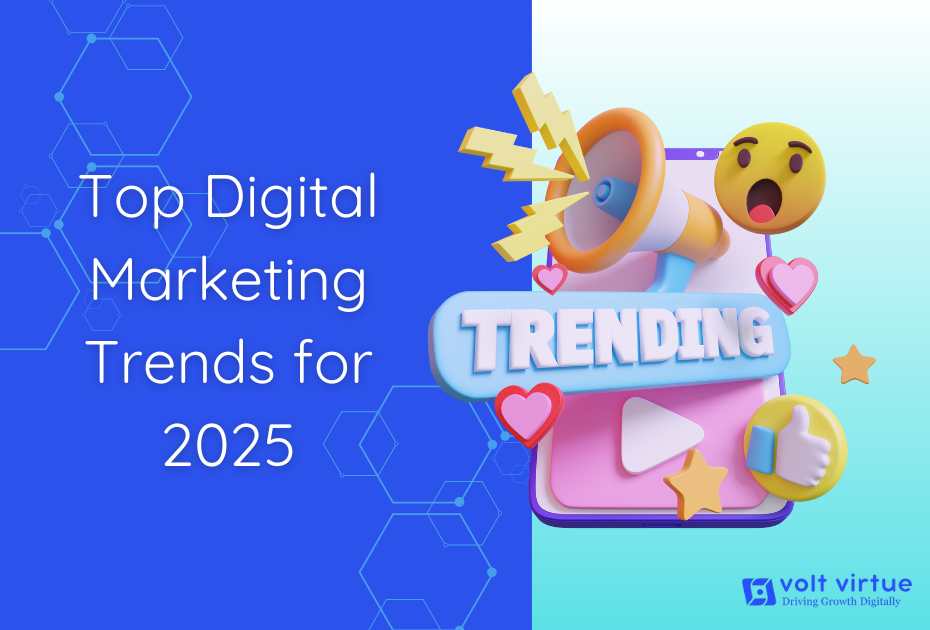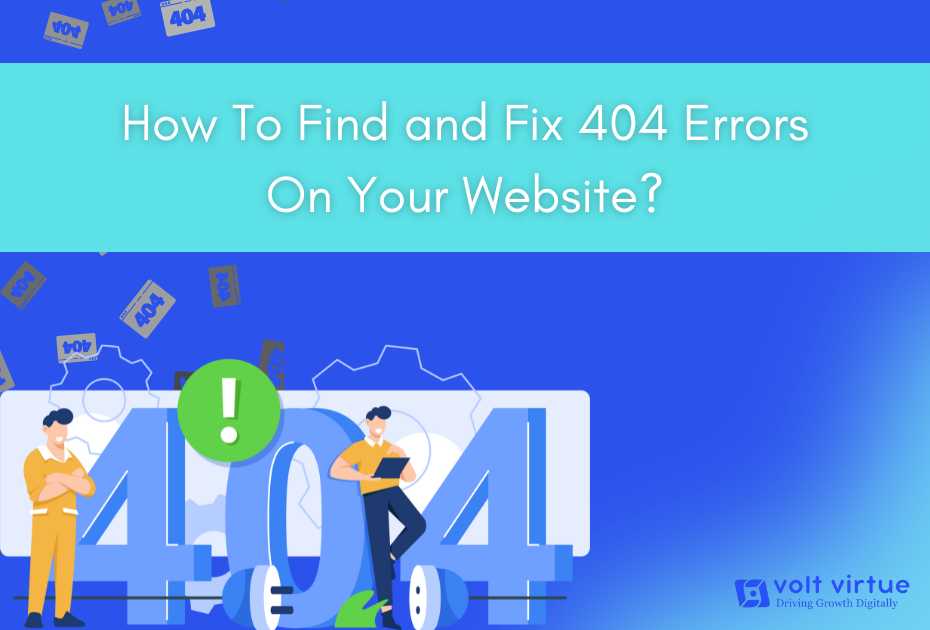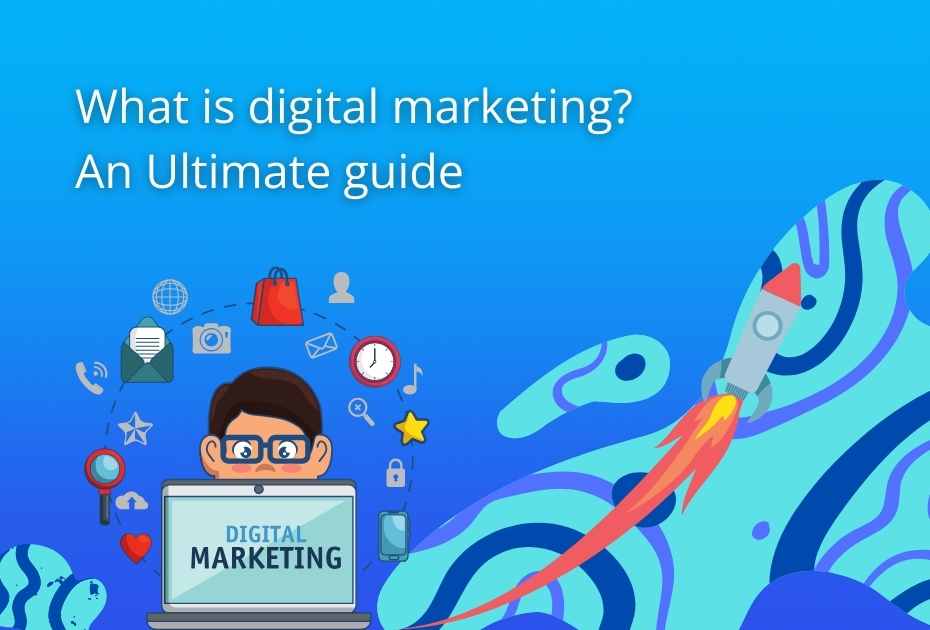
Digital marketing has become an essential component of modern business practices. It plays a crucial role in enhancing brand visibility, engaging with a global audience, and driving revenue growth.
By utilizing online platforms, businesses can connect effectively with their target audience, building strong relationships that foster brand loyalty and trust. Understanding digital marketing is essential, especially for marketing professionals aiming to excel in a rapidly evolving field.
As the digital landscape continues to grow, staying competitive requires a deep understanding of its various aspects. You can learn about digital marketing through online courses or by exploring this article for a comprehensive overview. This guide will cover everything from search engine optimization (SEO) to social media marketing, providing valuable insights into how digital marketing strategies and tactics contribute to overall business success.
What is Digital Marketing?
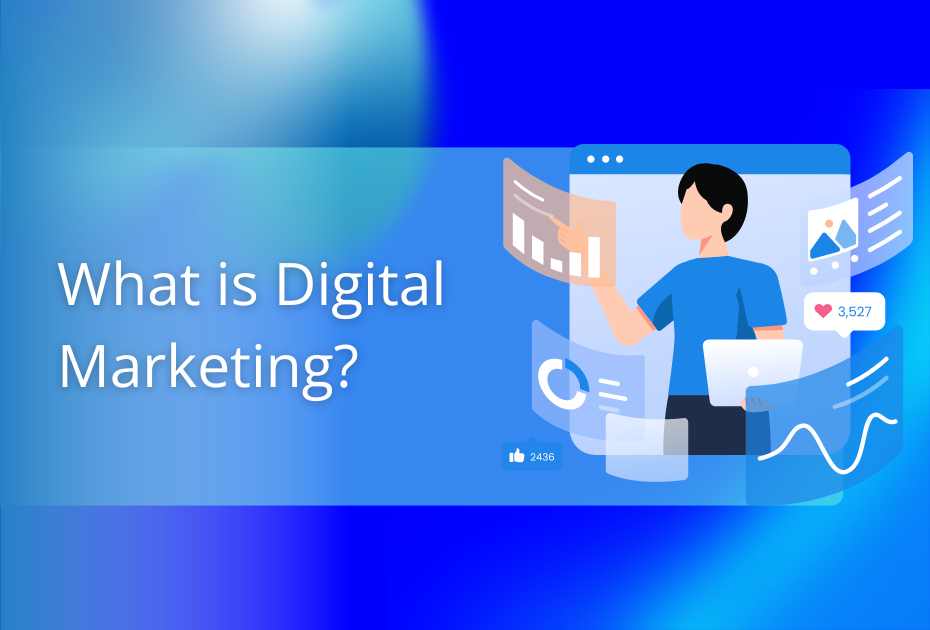
Digital marketing involves promoting brands through the internet and various digital communication channels to engage with potential clients. This includes strategies like text and multimedia messaging, email marketing, social media outreach, and web-based advertising.
Effective digital marketing begins by creating customer personas to find out which digital channels are best for reaching your target audience. A customer persona is a made-up profile that represents your ideal customer, including their buying habits, social media usage, interests, and basic details. Once you know your target audience, you can set digital marketing goals and decide how to measure and track your performance.
Digital marketing follows the same principles as traditional marketing but operates in the digital world. It leverages consumer data to identify target audiences and deliver highly relevant messages. While this approach is effective, the popularity of digital marketing means the biggest challenge today is finding ways to stand out from the competition.
The Importance of Digital Marketing
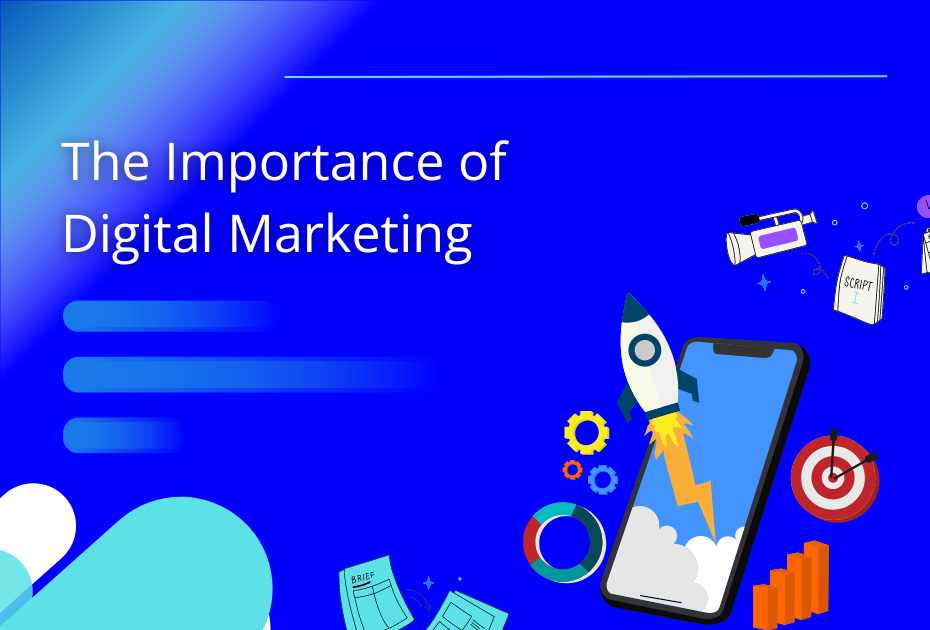
Once you understand what digital marketing is, it’s important to recognize why digital marketing is important. Unlike traditional marketing, which is limited by geography, marketing enables businesses to reach potential customers globally. This level of reach enables small companies and startups to compete effectively with larger players.
Digital marketing offers precise targeting, ensuring that marketing efforts are focused on specific demographics, interests, and behaviors, which enhances ROI. Its advantages include:
- Real-time data analytics and measurable results, enabling businesses to make data-driven decisions and swiftly adjust their strategies.
- Improved online visibility through SEO and content marketing, which attracts organic traffic and builds brand authority.
- Access to a wide range of internet users who spend considerable time and money online.
- The ability for small businesses to achieve top rankings with minimal advertising budgets.
- Laser-focused control over marketing messages to ensure they reach the target audience.
- Personalized marketing that fosters comfort and security, encouraging customers to engage and purchase.
- Tracking capabilities for ads and communication with target audiences.
- Scalability and adaptability for growing businesses, leading to optimized results and reduced wasted ad spend.
- Influence over purchase decisions of users searching for services or products online.
- Respectful marketing approaches that align with individual preferences.
With the rapid increase in mobile devices and users, digital marketing has become an essential tool for businesses aiming to grow in today’s dynamic environment.
The Benefits of Digital Marketing
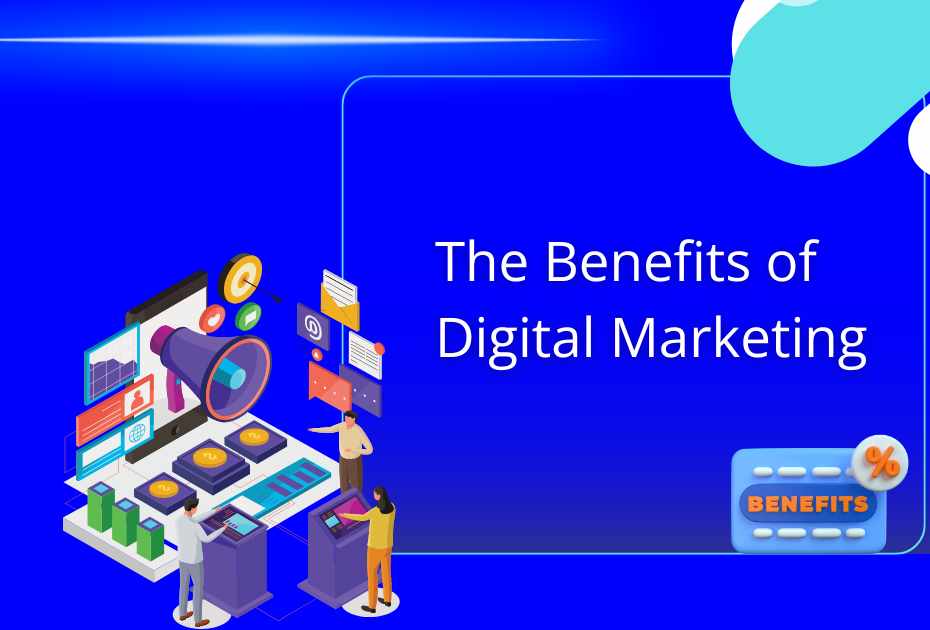
- Increased Reach: With 5.35 billion internet users worldwide, digital marketing allows you to connect with potential customers both locally and globally.
- Cost-Effective: Digital marketing is generally more budget-friendly than traditional methods, making it accessible to businesses of all sizes.
- Competitive Advantages: By analyzing insights and tracking data, you can use the right tools to create strategic digital campaigns that help you outperform your competitors.
- Better Targeting: By analyzing customer data and insights from digital platforms, you can determine customer demographics, interests, behaviors, and purchase intent. This allows you to create content that genuinely connects with your audience.
- Enhanced Engagement: Personalized campaigns and interactive marketing materials lead to higher engagement rates. This increased interaction often results in more conversions.
- Flexible Implementation: Digital marketing doesn’t rely on physical materials, allowing you to experiment and adjust your campaigns as needed. This flexibility helps you optimize your strategy based on real-time customer feedback.
- Measurable Results: Unlike traditional marketing methods, digital marketing provides analytical insights into campaign success. Key performance indicators (KPIs) such as website traffic, conversion rates, click-through rates, and social media impressions offer clear metrics to evaluate performance.
- High Return on Investment (ROI): Compared to traditional methods like direct mail and print advertising, digital marketing channels are more cost-effective. Creating content such as blog posts, social media updates, or email newsletters incurs minimal costs beyond the initial time investment, resulting in a high ROI.
Understanding the benefits of digital marketing helps businesses leverage its full potential to achieve better results and drive growth.
How Does Digital Marketing Work?
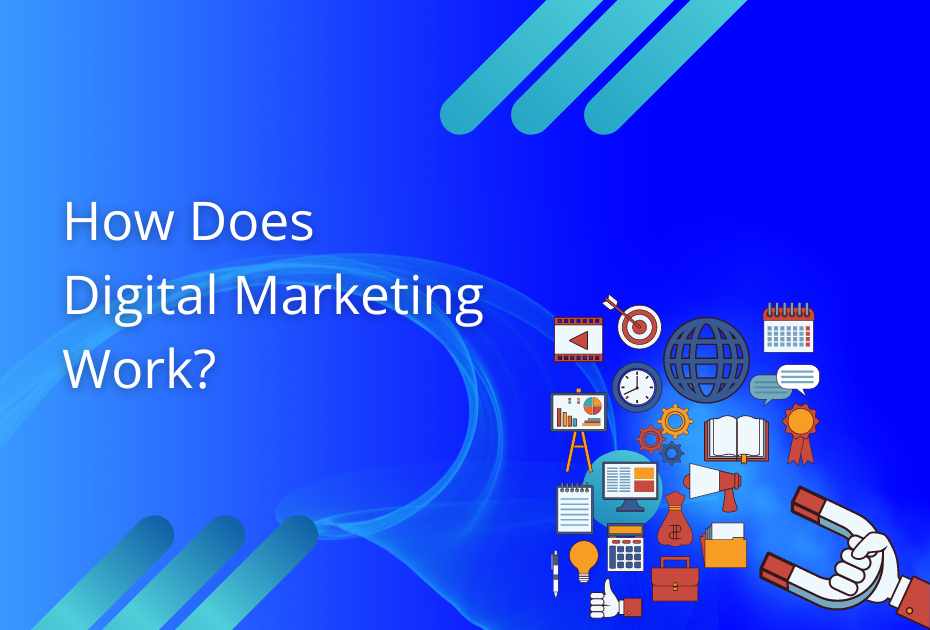
It involves creating campaigns with specific goals, such as increasing brand awareness, driving more traffic to your website, boosting sales, gaining social media followers, or accumulating likes.
Here’s a brief overview of the steps to launch a digital marketing campaign:
- Define Your Target Audience: Identify your ideal customer and gain insights into their needs, preferences, and behaviors. This will help you choose the best channels to promote your products or services.
- Set Your Marketing Goals: Decide what you want to achieve with your campaign, whether it’s increasing website traffic, generating more leads, or boosting sales.
- Choose Your Digital Marketing Channels: Select the channels that best align with your audience and goals, such as social media, email, SEO, or PPC advertising.
- Create Your Content: Develop engaging, informative, and relevant content to capture the attention of your target audience.
- Launch Your Campaign: Execute your campaign plan, which includes creating ads, publishing content, and managing social media.
- Monitor and Measure Results: Use analytics tools to track your campaign’s performance and adjust your strategy as needed. Key metrics to monitor include website traffic, click-through rates, conversion rates, and sales.
- Refine Your Strategy: Continuously review your results and refine your approach to enhance your campaign’s effectiveness.
Types Of Digital Marketing
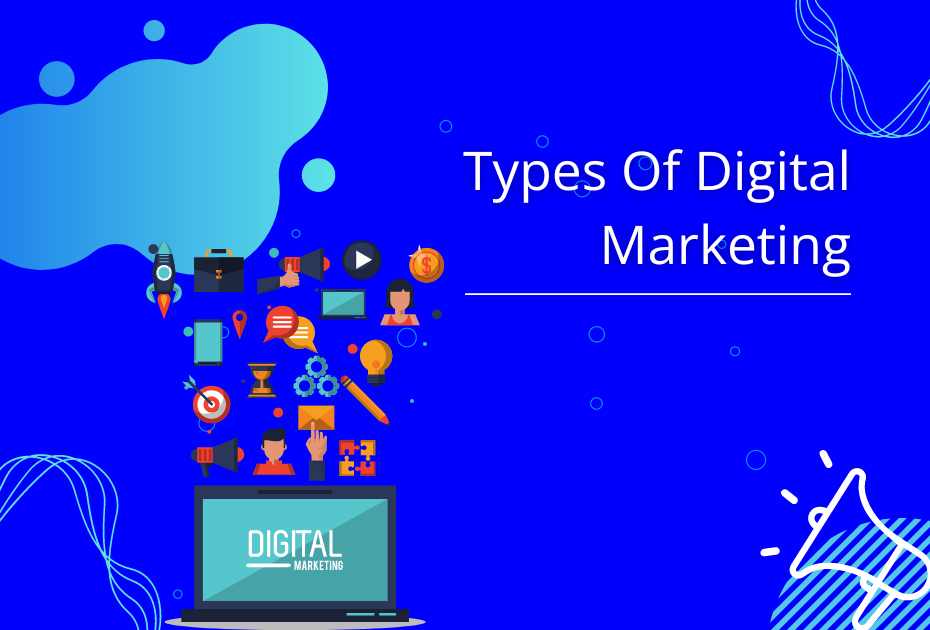
Digital marketing involves various strategies and platforms to maximize reach, boost sales, and optimize ROI. Combining multiple digital marketing methods often yields the best results. Here are the key types of digital marketing businesses can use to enhance their bottom line:
Search Engine Optimization (SEO)
SEO involves optimizing your online presence to rank higher in search engine results, like Google or Bing. By using high-quality content and relevant keywords, as well as optimizing elements like image alt text and video descriptions, you can attract more organic traffic to your site.
Content Marketing
This broad term covers the creation, management, and promotion of content, including videos, text, audio, and photos. Effective content marketing positions your brand as a thought leader and resource hub, fostering engagement and building trust with your audience.
Social Media Marketing
This strategy leverages social media platforms to reach and achieve marketing objectives. Being active on popular platforms and creating engaging content tailored to each platform can drive interactions and conversions. Collaborating with influencers is also a common practice in social media marketing.
Pay Per Click (PPC)
PPC ads are paid advertisements that appear in search engine results or on websites. You only incur costs when someone clicks on your ad, making it a cost-effective method for driving targeted traffic. Costs can vary based on keyword competition, but even small investments can yield significant results.
Affiliate Marketing
This involves third parties (affiliates) promoting your products or services in exchange for a commission on sales. Affiliates can be ‘unattached,’ ‘related,’ or ‘involved’ with your business, influencing their approach and effectiveness.
Mobile Marketing
This includes any marketing efforts targeted at mobile device users, such as push notifications and location-based ads. Mobile marketing is effective for reaching consumers on the go and involves personalized, time-sensitive messaging.
Email Marketing
Email marketing remains a powerful tool for achieving a high ROI. It allows you to send targeted messages directly to your audience, such as special offers, surveys, or updates. It’s also useful for maintaining customer relationships before, during, and after purchases.
Online PR
Online public relations involves improving your brand’s digital presence through strategies like SEO, social media, and content creation. It focuses on generating publicity and building a positive online reputation through various digital channels.
Sponsored Content
Sponsored content includes various formats like blogs, infographics, and videos, which are created and promoted with a focus on delivering value rather than direct sales. It is typically marked as ‘sponsored’ or ‘advertorial’ but aims to provide valuable information to the audience.
Digital marketing offers diverse ways to promote and grow your business. However, the effectiveness of these strategies depends on how well you address the associated challenges. Different brands face unique obstacles, such as generating social media traffic or measuring ROI, and must apply the right mix of strategies to achieve their goals.
How To Do Digital Marketing
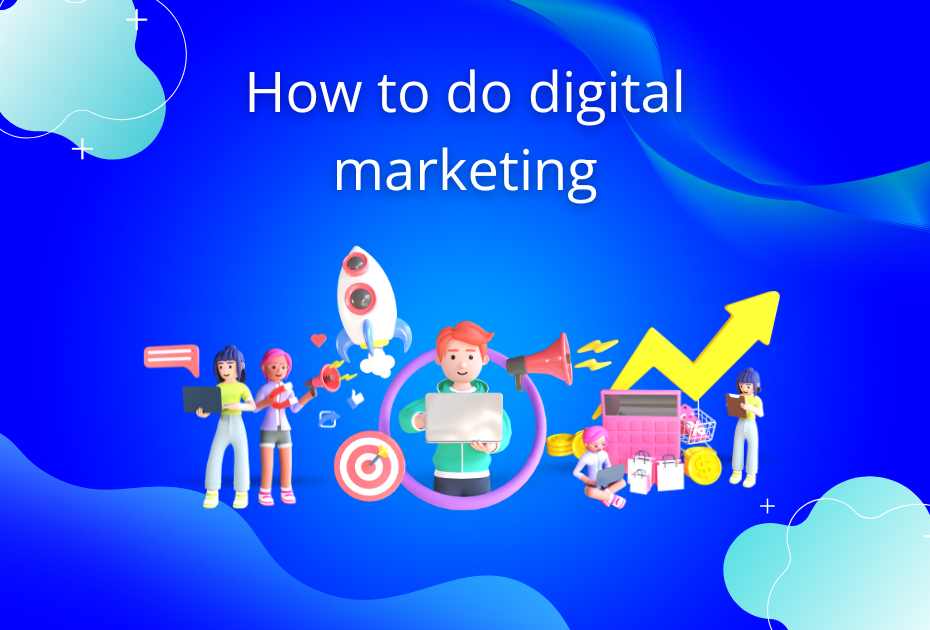
Digital marketing offers many options, which can be overwhelming. To effectively integrate digital marketing with your overall business strategy, follow this six-step process:
1. Define Your Goals
It offers numerous options, which can be overwhelming, but aligning it with your overall business strategy is key. Start by defining clear, measurable goals that match your business objectives and use relevant metrics to track progress. Understand your target audience and customize your content to match their preferences. Allocate your budget wisely across digital channels, balancing paid and organic strategies. Ensure your digital assets are optimized for mobile, as mobile traffic continues to rise. Finally, continuously refine your approach based on performance data and evolving trends to stay competitive and effective.
2. Identify Your Target Audience
Understand who your campaign will reach. Each audience is unique, so get to know the people engaging with your content on different platforms. Understanding your target audience allows you to customize your messaging and enhance engagement.
3. Set a Budget for Each Digital Channel
Allocate your resources wisely by setting a budget for each digital channel. This is crucial when using both organic and paid strategies. For example, B2B companies often require a larger budget due to longer buying cycles. Assign a percentage of your budget to each strategy based on its importance and expected return.
4. Select Your Digital Marketing Channels
Select the channels that align with your target audience and fit within your budget. Balance paid strategies, like PPC for quick results, with organic strategies, like SEO for long-term benefits. Focus on platforms your audience uses most. For instance, if targeting Gen Z college students, prioritize TikTok over Facebook.
5. Optimize Your Digital Assets for Mobile
With mobile traffic increasingly surpassing desktop traffic, ensure your marketing content is optimized for mobile devices. Design a seamless experience across both mobile and desktop to retain users as they switch between devices.
6. Refine Your Marketing Efforts
It is an ongoing process. Regularly monitor and analyze your performance using data from social media, email marketing, and site analytics. Adapt your strategy based on current trends and consumer behavior to stay ahead in this dynamic field.
Frequently Asked Questions About Digital Marketing
1. Does digital marketing work for all businesses?
Answer: Digital marketing can be effective for all businesses, regardless of their size, location, or target audience. As more consumers spend time online, it offers a cost-effective and accessible way to reach them. It is SMART—Scalable, Measurable, Achievable, Relevant, and Time-bound—allowing businesses to understand and connect with their audience more meaningfully. It also helps maintain relevance; even if there is little buzz around your product or service, it can still engage audiences and build lasting relationships. For businesses that operate offline, digital marketing can bring customers closer through tools like Google Maps, which can highlight your store to nearby prospects. To stay competitive and establish a unique digital footprint, developing an online presence through digital marketing is essential.
2. What’s the future of digital marketing?
Answer: The future of digital marketing is bright and brimming with potential. As internet usage and the Internet of Things (IoT) continue to grow, digital marketing is becoming increasingly popular and versatile. Many brands now prefer digital marketing over traditional methods due to its effectiveness and resource efficiency. With more everyday items becoming digital or smart, it will become even more pervasive. Electronic billboards featuring dynamic images and videos are on the rise, and home appliances with internet-connected screens present new opportunities to market products and services.
3. What does a digital marketer do?
Answer: A digital marketer designs and executes strategies to promote a brand, product, or service online. Their responsibilities include creating content for social media, managing email campaigns, optimizing websites for search engines, running online advertisements, analyzing data to assess campaign effectiveness, and interacting with the target audience across various digital platforms.
4. How is digital marketing different from traditional marketing?
Answer: Digital marketing differs from traditional marketing in both its approach and the tools it uses. Traditional marketing typically uses channels like billboards, print ads, and mailers, while digital marketing leverages social media, blog posts, and email to reach audiences. Recently, the distinction between traditional and digital marketing has blurred, as even traditional methods such as billboards, TV ads, and direct mail have incorporated digital elements.

